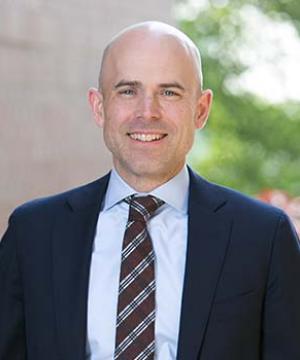Class of 2018 Chooses Edward Morrison as Professor of the Year
Professor Edward R. Morrison, the Charles Evans Gerber Professor of Law and an expert in bankruptcy law and law and economics, will be awarded the 2018 Willis L.M. Reese Prize for Excellence in Teaching by members of the Class of 2018 at their graduation ceremony on May 14.
Morrison was thrilled to receive news of the award. “If I have done decent work as a teacher, it’s only because of the great mentors and students who have inspired me over the years,” he said. Morrison recalled that his mentor, University of Chicago Law Professor Douglas G. Baird, would devote two hours of prep time for every hour in the classroom, even after thirty years of teaching – and feel crestfallen if a lecture went poorly. Another mentor, U.S. Supreme Court Justice Antonin Scalia, for whom he clerked, reminded Morrison that a professor will likely have as much impact through teaching as through research. Students also have played a key role in his development as a teacher. Morrison once sat down with a Columbia Law School student and watched a video of himself teaching so that he could get feedback on his performance.
In addition to his J.D., Morrison holds a Ph.D. in economics. He teaches Bankruptcy Law, Contracts, and Corporate Finance and also serves as co-director of the Richard Paul Richman Center for Business, Law, and Public Policy, co-director of the Columbia Summer Program in American Law in the Netherlands, and a Conferee for the National Bankruptcy Conference.
In his contracts course, Morrison oversees a small section of first-year students and said he tries to encourage his students to be less deferential to the law, or “the dead hand of the past,” as he put it.
“Many of the doctrines and rules are ideas that stretch back to ancient times but weren’t really laid down in a coherent way until the last 100 years or so,” he said. “I hope to give students the courage to be creative in the classroom and courtroom using a combination of cases, logic, history, facts, policy, and good-old-fashioned storytelling because that is what most legal arguments boil down to – good storytelling.”
Morrison’s student roster is much bigger in his corporate finance class. He views that course as such a crucial part of legal education that he lifts the standard enrollment cap, allowing anyone who wants in to sign up. “It’s one of few courses that give you formal, explicit tools for problem-solving. It’s like training you to use saws and protractors, but these tools are good for valuing companies and securities,” he said.
Bankruptcy strikes closest to home for Morrison because it’s the area in which he conducts much of his research. Although his classes on the subject focus mostly on corporate bankruptcy, Morrison turned his scholarly attention to personal bankruptcy issues after the 2008 financial crisis. One paper he worked on uses data from Atlanta, Chicago, and Memphis to examine the intersection of race and Chapter 13 petitions.
Playing off Tolstoy’s opening lines in Anna Karenina, Morrison said he loves bankruptcy because “every bankruptcy is unhappy in its own way. It could be due to tort liability, contract breaches, securities law problems, tax issues—there’s an incredible richness to this area of law.”
“The way I teach it every day is: Here are the problems. Let’s figure out how the law can come up with a solution.”
###
Published April 18, 2018
